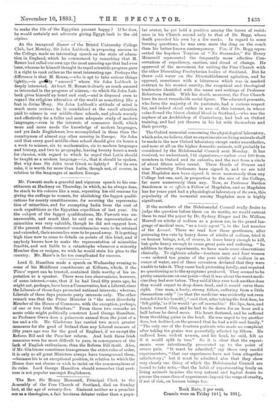The Rev. Sir Henry Moncreiff, Principal Clerk to the Assembly
of the Free Church of Scotland, died on Sunday last, at the age of seventy-five. Eminent neither as a preacher nor as .a theologian, a fair business debater rather than a popu- lar orator, he yet held a position among the forces of resist- ance in his Church second only to that of Dr. Begg, whose death preceded his own by a few weeks. In regard to some burning questions, be was even more the drag on the coach than his better-known contemporary. For, if Dr. Begg repre- sented the hopeless Toryism of " No Surrender," Sir Henry Moncreiff represented the frequently more effective Con- servatism of expediency, caution, and dread of change. He approved of the movement for uniting the Free Church with the other Dissenting Presbyterian bodies of Scotland. But he threw cold water on the Disestablishment agitation, and he opposed, sometimes with a bitterness which was in marked contrast to his wonted suavity, the exegetical and theological tendencies identified with the name and writings of Professor Robertson Smith. With his death, moreover, the Free Church loses its most remarkable social figure. The educated peasants, who form the majority of its pastorate, had a curious respect for, and indeed stood rather in awe of, this baronet, in whose veins flowed the bluest clerical blood iu Scotland,—who was the nephew of an Archbishop of Canterbury, had had an Oxford training, and had yet thrown in his lot with themselves and their poverty.


































 Previous page
Previous page